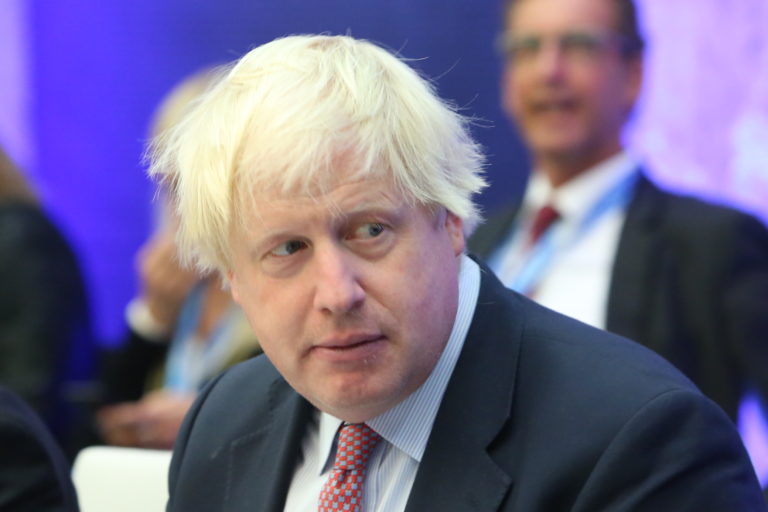Quote of the Day (previously used on Boris’s first Mayoral victory)
“He’s not the Messiah, he’s a very naughty boy.”
Monty Python, The Life of Brian
And so, it has finally come to pass, Boris Johnson is ordained as PM and the end of the world is nigh, and it is to come – most likely – with flames and fury in the form of a BoJo/Trump alliance. In congratulating Boris, Trump clearly couldn’t cope with the focus not being on him and quoted that Boris is ‘referred to as the Britain Trump’. Enough said…
Harking back to those heady days of Boris being a panel show politician, did we ever think this is where we would be? Clearly he did, and that is the rub. It seems we have all been contestants in a game we didn’t even know we were playing where only Boris knew the rules.
So here we are. Boris is PM, the cringe-worthy manoeuvrings of various politicians over many, many weeks (years) can finally end and perhaps government can get back to the job of actually governing. And, with the dynamics of an almost entirely new Cabinet, it seems that the domestic agenda is to be reinvigorated within the Boris administration.
Boris appears to have found the magic money tree which so many people have denied the existence of over recent years, as we are apparently recruiting 1000’s of police officers and will have sorted out the social care crisis (by Christmas it sounds like) so that’s all okay then.
The media have been salivating over the ‘brutal’ Cabinet reshuffle – but really, was it ever going to be anything else – and Tory remainers are apparently furious the Cabinet is filled with Brexiteers (minus Penny Mourdant who apparently was sacked for supporting Hunt, whilst Amber Rudd stays) again, what on earth did anyone expect? Don’t mistake the fluffy blonde hair to indicate a teddy bear, Johnson is ruthless, relentless and resourceful.
Cutting through the guff, what does a BoJo government actually mean (and I am specifically largely ignoring Brexit at this point to focus on the domestic agenda)? If he implements the model he had at City Hall, whereby he effectively acted as Chair, put in place an exceptionally strong team and enabled them to get on with it while he could concentrate on, well, no one is quite sure really but he seemed to have a lot of fun and City Hall was run rather well, so perhaps that is as good a model and motivation as any.
And what does this all mean for the built environment sector? Can we take the London Mayor Boris model as an indication of the approach PM Boris will take? Or does Boris morph into a new form with every role, rather like a political version Doctor Who?
The Big Stuff
Thankfully, no new or renamed departments or ministries and no new acronyms to try to remember or immense tax-payer funded stationery bills to accommodate logo and name changes. The ‘great offices of state’ are filled with Brexiteers, the meteoric Dominic Raab amongst them who is now Foreign Secretary and basically cast in the image of Boris when he had that role. Most recently it emerged that Raab appeared not to realise how important the Calais-Dover crossing was for UK trade, although he does at least know where both of those places are so it’s a start. The negotiations of Brexit have also been taken out of DEXEU and back into No.10, which is arguably where it should have sat anyway.
Jeremy Hunt apparently refused a move to Defence and was sacked as a result with the experienced and more hawkish Ben Wallace taking up the position instead. Priti Patel moves back into Government as Secretary of State for the Home Office, so a department already viewed as being shrouded in secrecy is now headed up by someone previously sacked for holding secret meetings with foreign governments with anti-immigration tendencies. But perhaps that is just a Boris tack to really annoy the Guardian and a specific segment of the population who are never going to support him anyway?
Sajid Javid as Chancellor is likely to be a very different money man than Spreadsheet Phil – just goes to show that being photographed in weird power poses on Whitehall works… As a former banker and viewed as having a much more relaxed approach to spending, he is likely to be in line with Boris’s agenda for tax cuts and spending hikes. An autumn budget (necessarily post Brexit deadline of 31st October) is expected and may be equally radical – whether we are in or out of the EU and in whatever form.
Andrea ‘Dreadsome’ Leadsom is the new Secretary of State for BEIS and likely to be very keen on reducing regulation and supporting business – particularly small business. Surely there will be a close eye on BEIS and the Budget given Boris’s previous ‘f*** business’ comments? Expect a business love-bombing to take place… On the other hand, she is also totally opposed to HS2, which is one of the central pillars of the Industrial Strategy so it will be interesting to see how that plays out.
Who the **** is Jenrick?
Is the question many of you may have woken up thinking? Well, let me enlighten you a little on the new Secretary of State for Housing, Communities and Local Government.
Elected in 2014, Robert Jenrick is a new breed of MP without the baggage of previous administrations. Boris is keen to be bringing up the new guard, promoting and encouraging them and thereby building up his longer-term support base. Jenrick also came out for Boris very early on and was active on the media rounds drumming up support.
Having been tested in a stint in Treasury where he was vocally supportive of new models of infrastructure finance and delivery, particularly across the Cambridge-Oxford arc, he is seen as a competent reformist who will bring a pragmatic Treasury head to what is regarded as a domestic priority in need of a shake-up, particularly when it comes to innovation in finance and structural reform.
He is very supportive of the new towns/garden villages agenda and sees more of these coming forward as critical to housing delivery with development corporations potentially playing a bigger role. He is also keen on fast tracking the disposal of public sector land (not exactly a new initiative but it will be interesting to see if any further proposals on this actually come forward and what the criteria are). He has also spoken about the potential for homes built on public sector land to be sold ‘at cost’ to local people under the age of 40 (pretty arbitrary but there may be the nub of a policy emerging there). We should also expect a slightly more nuanced approach to greenbelt release – although clearly not a greenlight as that would upset far too many voters. Alas, my one-woman mission to get someone in government to commit to undertaking a wholesale review of land-use across the entire country appears but a pipe dream…
He is also keen on the restoration of historic buildings and heritage and is likely to view this in the round with the emerging work of the Building Better, Building Beautiful Commission. Other areas of focus have been achieving full fibre broadband roll-out across the country and 5G implementation (perhaps he will restore PDR rights for 5G technology??)
Sitting under him will be Esther McVey as Housing Minister who is thought to have fairly radical (and very much in line with Boris) views on housing in terms of Stamp Duty, delivery mechanisms and planning. McVey seems to now sit in Cabinet, which puts housing right at the front of policy-making. This may be more to do with her Leave credentials than her portfolio but regardless, it still gives the portfolio more clout.
And, hot off the press, Jake Berry has also been announced as Minister for the Cabinet Office and MHCLG, attending Cabinet, apparently as another Housing Minister according to the Number 10 list, which would mean two housing portfolios and not yet a planning minister? It is not clear whether he is also retaining his position as Northern Powerhouse Minister.
More junior ministerial positions are to be announced but we should expect that, with the combination of the new face of Jenrick and McVey alongside the influence of Ed Lister at No.10, MHCLG will be entering something of a new phase. There are bills waiting in the wings but we should expect further delay as the new team reviews and makes their mark on all legislation. We should also expect some highly relevant initiatives in the autumn Budget so now is the time to start making representations!
Boris is keen on the metro Mayors and regional devolution so this may well form part of the agenda moving forward. At the same time, it is broadly known that neither he nor Ed Lister are particularly impressed with the delivery record of the current Mayor of London and, with some significant appeals in the wings, it will be interesting to see how the first decisions on the desk of the new Secretary of State are processed and delivered.
While you were sleeping…
Important to note that, while we have all been busy wondering what the future brings, MHCLG have been busy securing the future direction (as far as they possibly can) of planning and development by putting out various statements of intent and initiatives. From Building Better, Building Beautiful to revisions of general PPGs (including on greenbelt which indicates a vaguely more realistic approach to greenbelt release), a commitment to end segregated entrances on new developments, leasehold reform and commitments to community engagement, the new Secretary of State has much to address in his first 100 days in office. He could, of course, tear it all up and start again but, as a pragmatist, he is more likely to consider and review – and then start again.
So, it is nothing if not exciting times. Brexit is clearly going to remain the story of the day until at least the 31st October and probably beyond but, we can at least hope, that the domestic agenda (and the stuff that people on a day to day basis really care about) is picked up in a new legislative agenda. Watch and wait, one thing we can be sure of is that times under Boris are unlikely to be dull, which would be great if it was a panel show, a little less clear in real life…
For more information, visit the Snapdragon website.




